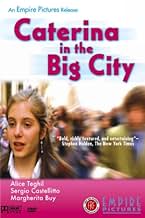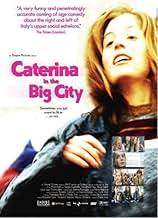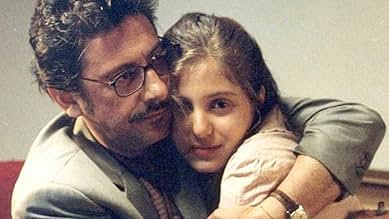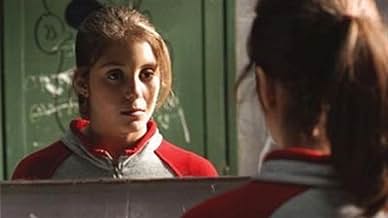IMDb RATING
6.8/10
3.3K
YOUR RATING
Caterina, forced to leave her small town at the age of thirteen, faces the complications of living in the big metropoly of Rome.Caterina, forced to leave her small town at the age of thirteen, faces the complications of living in the big metropoly of Rome.Caterina, forced to leave her small town at the age of thirteen, faces the complications of living in the big metropoly of Rome.
- Director
- Writers
- Stars
- Awards
- 7 wins & 9 nominations total
Zach Wallen
- Edward
- (as Zach -James Smith- Wallen)
Margerita Mazzola
- Martina
- (as Margherita Mazzola)
Martina Tasquetta
- Alessia
- (as Martina Taschetta)
Giulia Gorietti
- Giada
- (as Giulia Elettra Gorietti)
- Director
- Writers
- All cast & crew
- Production, box office & more at IMDbPro
Featured reviews
10Andy-296
This excellent Italian comedy is very similar in plot to Mean Girls (who came out in about the same time). The difference is that this is a much more politicized film. Caterina is a shy teenager from a small town in Italy, who moves to Rome with her long-suffering mother and her teacher father, when he is assigned to a new job there. In her new school, she has to choose to what clique to belong: the children of the progressive intellectuals or the children of the rich industrialists. The left or the right. What this film says is that these people are not terribly different between themselves. They both hold a degree of fame and power in Italian society, and look down upon those who don't. The outstanding performance in the movie is that of Caterina's father, the teacher Giancarlo (Sergio Castellito), a hothead angry that others have gotten all the breaks in life, who rants against the rich and privileged but who would sell his soul in a second in order to join the establishment. He is a familiar type of malcontent in real life but one who is seldom shown in the movies. There is a silly subplot of Caterina falling in love with an Australian boy (What they did that for? To reach an international market?), but all in all, this is one of the best Italian movies of the last years.
Caterina gives us an opportunity to feel and a chance to hope. A young girl both naive and somehow mature, she is unsure of what she wants in life. Her task is learning to navigate the waters of a high school in Rome where she is the new girl from the sticks when her father is transfered from a small town on the coast. He fulfills his dream of returning to the cultural mecca of the capital where he hopes to take his "rightful" place among the intelligentsia. But the film turns on just this point"rightful place". There are no simple answers, though we do have an opportunity to see how complex it is to find one's place, rightful or not, in the world. Caterina is something of a metaphor for the Italian populace at large, I would think. But she is more than this. There is something about her story that touched me, several decades and half a world away from the world she inhabits, a world stratified by cliques and patronage, prejudice and injustice...a world very much like the one I live in and the one I imagine most of us live in. Caterinaas the film that bears her namedoes not take the easy way out in running away or self-repression or living a life of quiet desperation, even when her sheltered provincial upbringing and less-than-ideal family situation do not give her any clues on how to deal with her new life and classmates from prominent families. She tries to adjust to the fast-pace and superficiality of life in the Italian capital, and much of the fun of the movie is seeing her in the various situations she encounters along the way. Her father is great as the frustrated writer with no talent and a loud voice, a self-important boor. My heart goes out to all the Caterinas of the world, who go forward with optimism and pure heart even when they know the odds are against them.
I wish I could say that this was a great film because there really were a lot of things that one could like about it.
As it turns out, however, it is a good, but flawed film. I will give this film a recommendation, I think it is worth seeing.
The film made a number of incredible social statements. It really cuts to the quick about the nature of society, the people who can manipulate the system on both sides are in collusion with each other to keep their privilege. The people who are on the outside find themselves on the outside, looking in. They can be taken under someone's wing but they are never really more then a pet, the Jimmy Olsen to someone's Superman.
The film had spectacular acting, particularly from the lead.
So what then keeps the film from being great? One of the biggest problems comes from the episodic and picaresque structure of the film. It has the kind of structure that is more interesting because of its discontinuity then because of its continuity. And while it makes for a lot of interesting discussions, this could turn a lot of people off, probably even more then the subtitles.
Honestly, the problem is that it begins with Caterina being pulled in many directions and it allows us to see facets of her through these different social lenses. The trouble is that we never get a baseline reading on her in the beginning before she moves to Rome. This is done very well but we never get the impression of her as anything more then a tablet that the ideologies of others are being written on, even at the end of the film when she supposedly finds herself. I won't give a spoiler as to how but the ending that someone else commented was her in her element is really just another case of this.
You know what, I've changed my mind. This is a wonderful film to watch. Its a spectacular way to look at what life is really like when you are outside the powerful and privileged circles of society and you can only be influenced by the ideologies of others but you really lack any voice of your own.
Watch this along with Welcome to the Dollhouse and see what life was like for the rest of us. Let this film show you the social cliques, collusion and ideology and let Solondz show you the sheer cruelty of a society that, as J. G. Ballard said, normalized psychopathy. And see it for what it really is, not some sugarcoated network television version (I think you guys know what very popular television series I'm talking about).
As it turns out, however, it is a good, but flawed film. I will give this film a recommendation, I think it is worth seeing.
The film made a number of incredible social statements. It really cuts to the quick about the nature of society, the people who can manipulate the system on both sides are in collusion with each other to keep their privilege. The people who are on the outside find themselves on the outside, looking in. They can be taken under someone's wing but they are never really more then a pet, the Jimmy Olsen to someone's Superman.
The film had spectacular acting, particularly from the lead.
So what then keeps the film from being great? One of the biggest problems comes from the episodic and picaresque structure of the film. It has the kind of structure that is more interesting because of its discontinuity then because of its continuity. And while it makes for a lot of interesting discussions, this could turn a lot of people off, probably even more then the subtitles.
Honestly, the problem is that it begins with Caterina being pulled in many directions and it allows us to see facets of her through these different social lenses. The trouble is that we never get a baseline reading on her in the beginning before she moves to Rome. This is done very well but we never get the impression of her as anything more then a tablet that the ideologies of others are being written on, even at the end of the film when she supposedly finds herself. I won't give a spoiler as to how but the ending that someone else commented was her in her element is really just another case of this.
You know what, I've changed my mind. This is a wonderful film to watch. Its a spectacular way to look at what life is really like when you are outside the powerful and privileged circles of society and you can only be influenced by the ideologies of others but you really lack any voice of your own.
Watch this along with Welcome to the Dollhouse and see what life was like for the rest of us. Let this film show you the social cliques, collusion and ideology and let Solondz show you the sheer cruelty of a society that, as J. G. Ballard said, normalized psychopathy. And see it for what it really is, not some sugarcoated network television version (I think you guys know what very popular television series I'm talking about).
One of the best movie I've seen recently. An exciting coming of age, an exhilarating comedy, a deep and painful portrait of our society at the present moment."Caterina Va in Città" has outrageously funny scenes starting with Giancarlo's biting farewell to his despised small-town students. But it's a very dark sense of humor. The film is really about personalities, especially his. Imagine a standard coming-of- age movie about a smart, unusual kid learning that it's okay to be an individual, different from the rest. Giancarlo is that kid, only he's 40-something and he hasn't had that final scene where everything turns out okay. Angry that others have gotten all the breaks in life, he righteously criticizes the establishment, big money, the old boys' network, and yet envies them at the same time. Back in Rome, he has a chance to mingle with exactly the class of people he inwardly resents, and every chance he gets to make a mark among them turns to embarrassment.
Played with great flair by Sergio Castellitto (the insouciant chef from "Mostly Martha"), Giancarlo is an enormously sympathetic but uncomfortable character, and his contradictions have a ripple effect on everyone in his orbit. His wife Agata (Margherita Buy) lives in a shell rather than get in the way of her grandiose husband. Caterina (Alice Teghil) is thrust uneasily into a social scene she's thoroughly unprepared for, made even more out of place by her dad's instructions. She doesn't seem to have inherited his low self-esteem, but this new life flies way over her head most of the time. It's a complex portrait of a family's struggle, set amid the tumult of big-city society and class consciousness. "Caterina" is a very rewarding movie.
Played with great flair by Sergio Castellitto (the insouciant chef from "Mostly Martha"), Giancarlo is an enormously sympathetic but uncomfortable character, and his contradictions have a ripple effect on everyone in his orbit. His wife Agata (Margherita Buy) lives in a shell rather than get in the way of her grandiose husband. Caterina (Alice Teghil) is thrust uneasily into a social scene she's thoroughly unprepared for, made even more out of place by her dad's instructions. She doesn't seem to have inherited his low self-esteem, but this new life flies way over her head most of the time. It's a complex portrait of a family's struggle, set amid the tumult of big-city society and class consciousness. "Caterina" is a very rewarding movie.
'Caterina va in citta' ('Caterina in the Big City') is an Italian film that takes as its storyline the coming of age of a young teenager transported by her family from the quiet Tuscany seaside village of Montaldo Di Castro to the challenging realities of Big City Rome, but that is only the means to an end of exploring Italian politico-social life and its effects on the youth of today. It comes very close to drowning in its own excesses, but at the root of the film is a sensitive tale of a young girl's struggles with growing into an adulthood that puzzles, frightens and challenges her.
Caterina (Alice Teghil) finds her greatest moments of happiness in her home town singing mezzo soprano in the choir: simple pleasures in a simple setting surrounded by country folk content to live life day to day. Her father Giancarlo (Sergio Castellitto) is a teacher who can't hold a job, partially because he is so outspoken and partially because he is a raving truly obnoxious person. Her mother Agata (Margherita Buy) is subservient, a woman with few coping mechanisms who allows her odious husband to run an abusive household. Giancarlo's aunt is ill in Rome and with the idea of finding a job where his talents are respected, Giancarlo uproots his little family and moves to the big city. There the social castes are evident and Caterina is judged a country hick until she is befriended by first a rebel who bonds with Caterina, introduces her to tattoos and liquor, and causes a schism between her important mother (Giancarlo hoped to have is novel published by the woman), the daughter and his family. Caterina then is absorbed into the rich and spoiled rank and file of the wealthy, not fitting in until the girls do a make over. That situation is again disrupted by Giancarlo's blindly inappropriate behavior. The true Caterina is somehow lost, still dreaming of becoming a fine mezzo soprano, but tagging along with the crowd du jour. Ultimately Giancarlo's multiple and consistent failures drive him away from the family, he rides off to oblivion on his restored motorbike, and Agata and Caterina both bloom.
The noise level of this film is such that it is difficult to watch: the young girls means of communication is a mixture of screaming, loud talking, and fighting and otherwise making us uncomfortable. Yet underneath all of the political and social expose and brandishing is a truly wonderful young Caterina whose life as a soap opera is watched tenderly by an Australian boy who plays the guitar and observes her family from a window across the way from Caterina's Rome home. The moments toward the end of the film when the playback comes justifies the fuss of getting there.
This is not a film this viewer would sit through again, but reflecting on the story after all the commotion is over, hearing Mozart's 'Ave Verum Corpus' and Verdi's 'Nabucco" etc as the inspiration behind Caterina's honest dreams, makes is a more memorable experience. In Italian with English subtitles. Grady Harp
Caterina (Alice Teghil) finds her greatest moments of happiness in her home town singing mezzo soprano in the choir: simple pleasures in a simple setting surrounded by country folk content to live life day to day. Her father Giancarlo (Sergio Castellitto) is a teacher who can't hold a job, partially because he is so outspoken and partially because he is a raving truly obnoxious person. Her mother Agata (Margherita Buy) is subservient, a woman with few coping mechanisms who allows her odious husband to run an abusive household. Giancarlo's aunt is ill in Rome and with the idea of finding a job where his talents are respected, Giancarlo uproots his little family and moves to the big city. There the social castes are evident and Caterina is judged a country hick until she is befriended by first a rebel who bonds with Caterina, introduces her to tattoos and liquor, and causes a schism between her important mother (Giancarlo hoped to have is novel published by the woman), the daughter and his family. Caterina then is absorbed into the rich and spoiled rank and file of the wealthy, not fitting in until the girls do a make over. That situation is again disrupted by Giancarlo's blindly inappropriate behavior. The true Caterina is somehow lost, still dreaming of becoming a fine mezzo soprano, but tagging along with the crowd du jour. Ultimately Giancarlo's multiple and consistent failures drive him away from the family, he rides off to oblivion on his restored motorbike, and Agata and Caterina both bloom.
The noise level of this film is such that it is difficult to watch: the young girls means of communication is a mixture of screaming, loud talking, and fighting and otherwise making us uncomfortable. Yet underneath all of the political and social expose and brandishing is a truly wonderful young Caterina whose life as a soap opera is watched tenderly by an Australian boy who plays the guitar and observes her family from a window across the way from Caterina's Rome home. The moments toward the end of the film when the playback comes justifies the fuss of getting there.
This is not a film this viewer would sit through again, but reflecting on the story after all the commotion is over, hearing Mozart's 'Ave Verum Corpus' and Verdi's 'Nabucco" etc as the inspiration behind Caterina's honest dreams, makes is a more memorable experience. In Italian with English subtitles. Grady Harp
Did you know
- TriviaSara Pallini's debut.
- GoofsThe story begins in 2003, but the dates do not match up with the days of the week for that year.
- ConnectionsReferences Les Blues Brothers (1980)
- SoundtracksInno ufficiale dei giovani fascisti
Music by Giuseppe Blanc and lyrics by Vittorio E. Bravetta
Sung at the wedding reception
- How long is Caterina in the Big City?Powered by Alexa
Details
- Release date
- Country of origin
- Language
- Also known as
- Caterina in the Big City
- Filming locations
- Production companies
- See more company credits at IMDbPro
Box office
- Gross US & Canada
- $296,464
- Opening weekend US & Canada
- $9,352
- Jun 5, 2005
- Gross worldwide
- $4,407,426
- Runtime
- 1h 47m(107 min)
- Color
- Sound mix
- Aspect ratio
- 2.35 : 1
Contribute to this page
Suggest an edit or add missing content






















